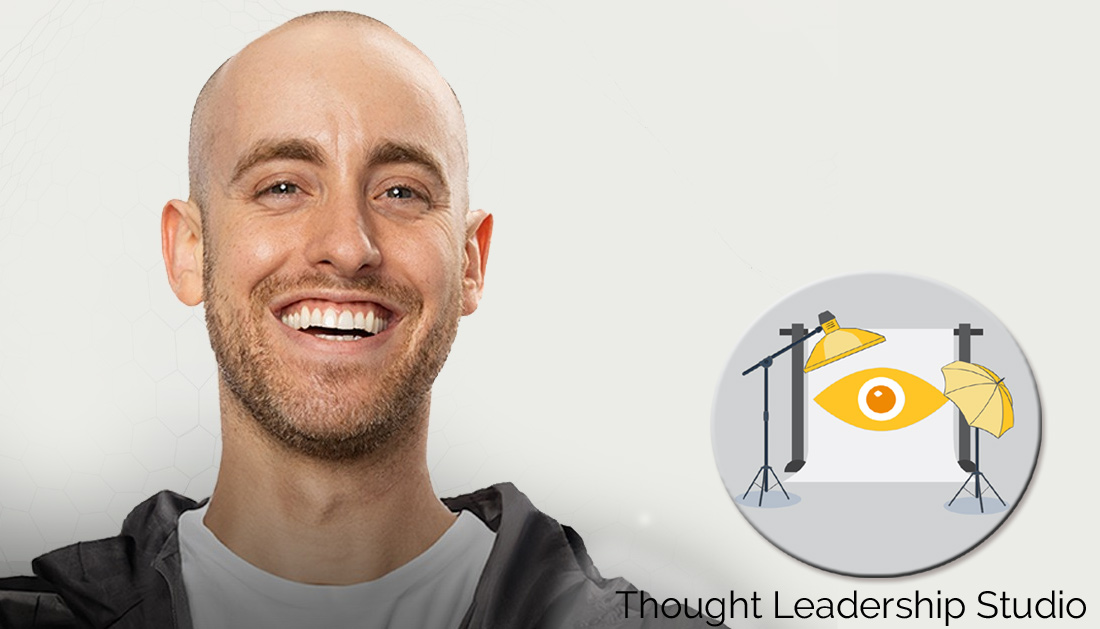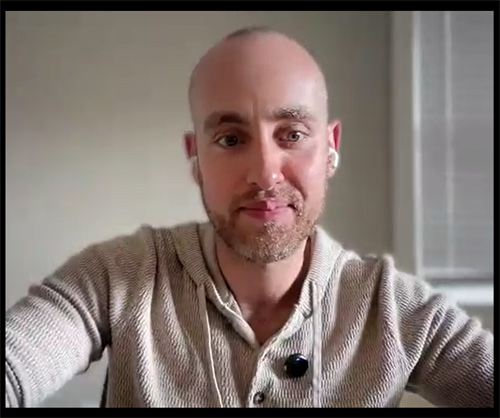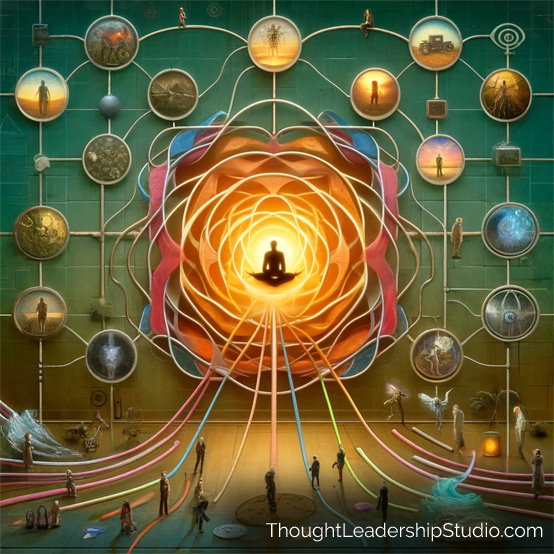Thought Leadership Studio Podcast Episodes:
The Power of Personal Branding with Jason Moss
Episode 86 - Building Authentic Connection: Standing Out, Engaging Audiences, and Growing a Thriving Online Business

#coaching, #communication, #consulting, #contentmarketing, #creativity, #influence, #interview, #interviews, #leadership, #marketing, #marketingstrategy, #personalbranding, #socialmedia, #storytelling, #thoughtleadership, #thoughtleadershipmarketing
Or Click here to listen or subscribe on appWhat this episode will do for you
:- Jason Moss's Coaching Journey: Discover Jason’s evolution from his first online ventures to becoming a multi-six-figure business coach and community leader.
- Keys to Online Business Success: Uncover the critical factors Jason believes differentiate successful online entrepreneurs from those who struggle.
- Building an Audience with Intent: Learn how to connect with audiences through a heart-centered approach, focusing on service over self-promotion.
- Crafting Distinctive and Authentic Content: Understand the power of unique perspectives and personal storytelling in making content that resonates.
- The Role of Vulnerability in Personal Branding: Gain insights into how sharing personal stories and challenges can create a deeper connection with your audience.
- Standing Out in a Noisy Digital Landscape: Explore Jason’s tips for cutting through content overload by embracing authenticity and fresh ideas.
Jason Moss.
"In this episode of Thought Leadership Studio, I’m thrilled to introduce Jason Moss, a multi-six-figure business coach and leader of a 20,000+ strong coaching community. Jason has helped thousands of coaches grow their businesses by focusing on authenticity over aggressive tactics.
Featured in Entrepreneur, Jason shares his journey from his first sale at 13 to scaling a multi-seven-figure business. His unique 'inside-out' approach combines identity with strategy, empowering coaches to thrive with alignment and ease.
In our conversation, Jason reveals key pillars for success, overcoming content barriers, and selling authentically. He leaves us with practical advice for coaches eager to build influence and scale their impact.
Some of Jason's coordinates:
Curated Transcript of Interview with Jason Moss
The following partial transcript is lightly edited for clarity - the full interview is on audio. Click here to listen.
Chris McNeil: I'm Chris McNeil, with Thought Leadership Studio, and I'm sitting here across Zoom with Jason Moss, who is a multi six figure business coach who has empowered thousands of coaches to grow their businesses and sign more clients leading a community of over 20,000 coaches online. Jason integrates identity and strategy to help entrepreneurs build profitable coaching businesses from the inside out with features an entrepreneur and online business owner, his heart-centered marketing approach offers a refreshing departure from conventional tactics.
Jason resides in Boulder, Colorado as we were just discussing and enjoys hiking, meditation, and personal growth in a spare time. Welcome, Jason. Great to have you here.
 Jason Moss: Thanks Chris. Appreciate it..
Jason Moss: Thanks Chris. Appreciate it..
Connection as Currency: Authentic Marketing and Community-Building
Chris McNeil: So to give our audience some context about where you're coming from, if they're not already familiar with you and your work, can you share what sets you off on this path? Sometimes we talk about the pivotal moment or circumstances set of circumstances that trigger someone to go on the journey that winds them up on a podcast like this.
Jason Moss: Yeah, that's a great question. Well, I mean, I've always been passionate about a few things, one of which is connection and community and building relationships. The other is marketing, and really I see marketing as connection and relationships and community and also this whole online world is something I've always been really interested in.
So my first online business, I think I was 11 years old, I had built this software program that made it so that when I played my favorite computer games, I didn't have to put in the CDs. And after six months of locking myself away in the back office of my home growing up, I programmed this thing and put it down in the world.
 And I remember one day I woke up and at this time it was hard to set one of these things up. I had asked my dad for a payment processor, he had to sign on it, but I got this thing up and running and I remember one day opening up my email and seeing my first sale come in, and I was just so fascinated by the fact that I could connect with this person on the other side of the world who I had never met in person and build some kind of relationship or connection in that case, a transaction.
And I remember one day I woke up and at this time it was hard to set one of these things up. I had asked my dad for a payment processor, he had to sign on it, but I got this thing up and running and I remember one day opening up my email and seeing my first sale come in, and I was just so fascinated by the fact that I could connect with this person on the other side of the world who I had never met in person and build some kind of relationship or connection in that case, a transaction.
But that's something that's always been really fascinating for me. And so when I was in high school, I was a musician and a singer of songwriter. I built this big online platform on MySpace at the time, which was the big platform that everybody was using to share my music and connect with people and really learned so much about building online communities and later on spent some time as a director of sales and then became a business coach.
But really the common threads, I think through everything have been a love for marketing, a love for connection, and a fascination around what makes people tick. How do we build these relationships online and how do we do that in a way that allows us to create more of the impact that we want and also to build profitable businesses that allow us to support ourselves and experience more of the financial freedom and all of the things that we want on a personal level,
The Real Ingredients of Online Success: Heart of Service and Cutting Through Noise
Chris McNeil: It just seems like the internet gives every person the opportunity to create financial freedom, but so many try but don't reach it either. Maybe give up too early or don't know the right levers to pull to build an audience or they don't have the skillset necessarily to engage an audience in a message or a clear message developed around what they're doing.
What are the critical factors that you see as distinctions in those who are successful at creating a business online versus those who aren't?
Jason Moss: Yeah, that's a good question. And the truth is there isn't one thing, there's probably thousands of them, but when I first started coaching back in 2016, my first year I made $4,700. I made almost no money and I felt like for so long I was showing up, I was putting myself out there, I was sharing my thoughts with the world and it felt like no one was paying attention. I would get two hearts and likes from my mom and my aunt.
And for years I wondered what does it actually take to do this? And so this has been something that I've studied for a very long time. And I think there's a couple of things that comes down to the first thing is I think you got to have the right intentions. There's lots of reasons you might want to build a platform, but the people that I see that are most successful show up with the heart of service, which means you have something of genuine value to be able to offer others. And your intention for building a platform is not so much to build an audience.
 It's more like I have these important things that I want to share and say, and my ability to build an audience or build the platform online or have followers or all these things, they're kind of a byproduct of that. So the people that I find that are chasing the how do we get views, how do we build this big thing that's more about me, those are the people I don't see as successful as the people who show up every day sharing unique, innovative ideas from that place of, Hey, I know I have something here that can really help someone else.
It's more like I have these important things that I want to share and say, and my ability to build an audience or build the platform online or have followers or all these things, they're kind of a byproduct of that. So the people that I find that are chasing the how do we get views, how do we build this big thing that's more about me, those are the people I don't see as successful as the people who show up every day sharing unique, innovative ideas from that place of, Hey, I know I have something here that can really help someone else.
I think that intention is really at the core of what success in business and what success and thought leadership comes down to. And then there's the mechanics. It's how do we stand out in a really noisy world, whether someone pulls up LinkedIn or someone pulls up Facebook and in the course of a minute you can see a hundred pieces of content. And so we're all so inundated with information. So there really is an art and a science to be able to break through that noise. And there's definitely things that I've learned over time just about being able to stand out in that context.
And it's only gotten noisier I think over the past few years, which in some ways makes it more challenging, but in other ways I think there's such an opportunity for innovative human messages to really be able to cut through the noise. So there's a mechanic to that for sure, which I'm sure we'll talk about more. But really the hardest service I think is underneath it all.
Unlocking Authentic Influence: Meeting Clients Where They Are
Chris McNeil: I love that. And that really speaks to the perspective of outside in - 'What are you doing for others?' Go to their point of view and look at how your business looks and how your message looks. And like I said, the heart of service really caring about making a positive difference. And I love that you mentioned something around, I have something that's unique and distinctive, which speaks to of course, the creativity aspect.
I believe everybody's creative, but not everybody knows how to access their creativity. Some people have false belief systems that they're not creative, so they don't really access it, but it's in there and around this thought stream of wanting to make a positive difference, wanting to share something distinctive. How would someone say if someone was your client say, 'Hey, I'm a coach, I feel like I've got something special to share'. Or I guess it could apply to consultants too, but I feel like you've got something special to share. How would I discover what that is or how would I articulate that so that it impacts others?
Jason Moss: Well, I think one of the maybe common mistakes that people make in this whole online space, and I've certainly made it too, is there's a balance between the focus on us and what we want to share and whatever is alive for us in a moment. And also what's going to be of service to somebody else.
And I think that in my experience when I've gotten really obsessed about understanding who my ideal clients are, who I want to connect with, what their challenges and problems are, how they see their world, it's helped me build a bridge back to what I want to say and how to formulate and how to craft a message in a way that is relevant to them and is going to meet them in their current worldview. And I think so much of creating a message that stands out is about this.
 It's how do we build that bridge? It's like you've got something you want to share, but how do you contextualize it in a way that is relevant to someone else's desires and someone else's dreams and the things that they want or the challenges that they have, and the ability to build that bridge starts with empathy. It starts with understanding somebody else's worldview. It's like, I could go to you and I could say, well, the real reason your posts aren't getting traction is because you're not in the heart of service.
It's how do we build that bridge? It's like you've got something you want to share, but how do you contextualize it in a way that is relevant to someone else's desires and someone else's dreams and the things that they want or the challenges that they have, and the ability to build that bridge starts with empathy. It starts with understanding somebody else's worldview. It's like, I could go to you and I could say, well, the real reason your posts aren't getting traction is because you're not in the heart of service.
But if someone doesn't, they're not even thinking about that. They're probably just feeling frustrated because they're posting all this stuff and they're not getting visibility or they feel like their posts are getting lost in the void. That message isn't going to really land. But if I start by saying, Hey, I see you out there posting and sharing your voice and you're really showing up and you're not getting the traction you want, and it can feel pretty discouraging sometimes, doesn't it?
Now suddenly I've met them in that moment and I've created a little bit of a connection. And then once I create that little moment, I can say I've worked with a lot of people and over time in helping a lot of leaders build platforms online, what I've found is oftentimes if you're in that place where you're posting, you're posting, you're not getting the traction you want, oftentimes what's underneath that is you might not be showing up with the right intentions.
Building the Bridge: Leading Audiences to New Perspectives
Now I've built a bridge from what they care about back into my idea and back into my world. And the ability to do that at scale through a platform, I think ultimately is one of the biggest things that determines your reach, your impact, your ability to meet people where they are and then bring them into a new idea or a new way of seeing things or a new insight or a new perspective. That is, I think, so much of what it comes down to.
Chris McNeil: I love that, and I've used the metaphor of the bridge a lot myself to describe the concept of strategic thought leadership because you've got to lead people from where they are and not be on an island, need a bridge to the island territory on the other side, and all the reasons you might want to leave that territory and favor of new territory that you're encouraging them to cross the bridge for. And this has almost universal applicability to anybody who's dealing with online influence, not just coaches, of course.
I love coaching and I think it's one of the highest leverage points more in teachings. You're dealing with people's mental models, not just knowledge. It's really powerful and their belief systems about what they can do and what's possible for them. It's really high leverage and people can find themselves in coaching roles within large organizations.
 They can find themselves in coaching roles and consulting relationships and creating marketing campaigns. And who isn't trying to market. We're all trying to market and sell at least a point of view to those that it will impact in a positive way. So let's get more into the mechanics, thinking about our listener who might be a coach, who might be a consultant, who might be a marketer, he might be an entrepreneur, a founder, a thought leader of some sort, somebody who's interested in positive online influence.
They can find themselves in coaching roles and consulting relationships and creating marketing campaigns. And who isn't trying to market. We're all trying to market and sell at least a point of view to those that it will impact in a positive way. So let's get more into the mechanics, thinking about our listener who might be a coach, who might be a consultant, who might be a marketer, he might be an entrepreneur, a founder, a thought leader of some sort, somebody who's interested in positive online influence.
Cutting through the noise, as you mentioned, is a huge issue now, especially with AI generated content. It just makes it easier for more people to create more content. I think AI can be a powerful tool, but can also be misused and just create parent content more. The same thing everybody else is saying too. Where do you see the lever points? Where do you see the building blocks of creating effective online campaigning?
Jason Moss: Yeah, it's a big question. There's so much to say on this, but to your point on AI, I mean, we have these amazing tools today that make it possible to create lots of content at scale that in many ways is making things harder because you've got more people putting things out there. But in other ways, if you look at the content that's actually being created, a lot of it is, it is very boilerplate. It essentially is a regurgitation of the past.
What these large language models are doing is they're just taking lots of data based on things that have already been published and kind of rehashing and recirculating it. So there's a desire for, I think a couple of things and the things that really stand out in today's world, number one, to your point on thought leadership and one of the reasons why we connect, and I appreciate the work you're doing, what do you have new to say?
Bringing Humanity Back: Personal Storytelling in an AI-Dominated World
What's a fresh perspective? What's something that is genuinely coming from you that's a new idea? So being able to share those things and not just regurgitate the same, the three tips for X, Y, Z type content that maybe worked 5, 10, 15 years ago, the lightweight kind of boilerplate stuff, it's commoditized now because you have these tools that make it so easy to create that anyone can go into chat GPT and in 30 seconds say, write me a post with five tips on how to grow my business.
And it's this lightweight kind of, here's a couple tips. So that stuff's out. So fresh, innovative perspectives I think is one thing. The second thing is your humanity. And we spend a lot of time when I work with coaches talking about building a personal brand because I think one of the most powerful things that we all have is ourselves, our ability to bring the humanity of who we are into the content and to use storytelling, to share insights and perspectives where we're not just sharing information, we're sharing it through the context of our lives.
 And I think that is ultimately when you can take a post. For example, this morning I sent out a post about money, and I think I sent it out to my email list and I was talking about how I've noticed that over my journey as a coach, as I've scaled my business, the more focused I get on making more money, the less money I make.
And I think that is ultimately when you can take a post. For example, this morning I sent out a post about money, and I think I sent it out to my email list and I was talking about how I've noticed that over my journey as a coach, as I've scaled my business, the more focused I get on making more money, the less money I make.
And it's actually the detachment from the desire of more money that paradoxically makes it easier to make more. So I could have just explained that as a concept, but instead, I started out at the post and I said, when I was living in Los Angeles and I was single, there were several years that I was going out on dates and I was meeting lots of really amazing women, but we'd go on these dates and it wouldn't really go anywhere.
And I met all these people and it just seemed like things were constantly fizzling out and I really wanted to be in a relationship and I was trying really hard to make that happen. But it wasn't until I let go of that desire that I met my partner today, Kimberly and four and a half years later we're living in this beautiful home in Boulder. And that lesson really taught me the value of letting go of the desire for the thing that I want.
And this is how it connects to your desire to grow your business, and maybe you're attached to this idea of making money. So I use this personal story and this personal anecdote about my own life to kind of bring into the concept, and this could have been a boring conceptual piece of content, but the ability to make it fresh with my own humanity, with my own storytelling.
This is the stuff that I think people are really craving today because we're so inundated with AI generated lifeless stuff that has none of that in it. So when you can show up and fuse your own self and your own being with the concepts and the ideas and bring yourself fully into the platform, I think this is where the real opportunity is. And more so than ever before, the power of a personal brand, I think it's just going to become even more important and even more of a powerful differentiator for people who are really wanting to stand out and make sure that their ideas are heard and cut through the noise.
Vulnerability as a Bridge to Connection
Chris McNeil: And I understand where you're going with that, and I agree a hundred percent. I've run into people who feel like having a personal brand is about ego, but to me it's more about vulnerability and connection and being open, but the concept of being vulnerability sometimes it's scary to people to be able to be vulnerable. Have you run into that and how do you deal with that with a client?
Jason Moss: It is hard. It's hard for me. It's a very difficult thing for me to do as well. I mean, I'm an introvert by nature. I'm not someone who loves having all the lights shining on me. But to your point, I think a lot of this comes down to how you see the act of sharing and do you see it as a personal act of glorification?
It's like, let me bring all the spotlight on me, or is it more of I'm using my own story and my life as a way of teaching and serving and helping others and even showing others what's possible. When I talk about, and we spend, I help coaches make more money, this is a big part of what I do. So I often talk about my own financial success in my content, and there's a way of looking at that where it's like, oh, you're just bragging or just making it about yourself.
 And there's another way of looking at it. Can I create a possibility for somebody else through showcasing this aspect of my own life so that when somebody else sees this, maybe if they have a belief of like, oh, this isn't possible for me, or I can't make this happen, seeing my own story opens the door for them. And so looking underneath, you can look at the same action on the surface, you can look at two people who are sharing the same thing, but one comes from an attention of ego and one comes from the intention of this is really not about me at all.
And there's another way of looking at it. Can I create a possibility for somebody else through showcasing this aspect of my own life so that when somebody else sees this, maybe if they have a belief of like, oh, this isn't possible for me, or I can't make this happen, seeing my own story opens the door for them. And so looking underneath, you can look at the same action on the surface, you can look at two people who are sharing the same thing, but one comes from an attention of ego and one comes from the intention of this is really not about me at all.
This is really just about the people I'm here to serve and completely different. And it will feel completely different and you'll feel a lot less resistance when you're rooted in service, which is why coming back to what I started out with, I think honestly the most important key to success is genuinely showing up in the heart of service. And when you can see everything you do your platform, really it is not so much about you, it's more about these other people.
And even sharing from your own perspective is really still about them, then everything gets a lot easier and there's a lot less resistance. And the fear around vulnerability often will dissolve a away as well, because you see vulnerability not as a self-serving thing, but more as like, Hey, me sharing my own challenges or the struggles creates possibilities for others and it helps other people feel less alone. And it helps people feel like, oh, I'm not the only one out here who is having a hard time with this.
***************************************
The transcript is lightly edited for clarity and is a partial transcript- the full interview is on audio. Click here to listen.
***************************************
Free Stuff and Offers Mentioned in Podcast
***************************************
***************************************